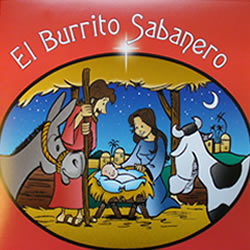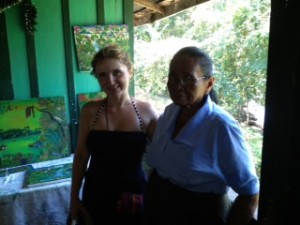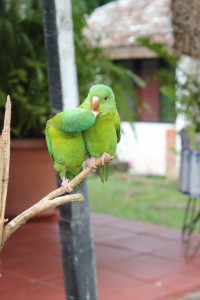 When you live in a place where December is as hot as July is elsewhere, Christmas imagery depends a lot less on snowmen, sleigh rides through the wood to grandmother’s house, and chestnuts roasting on an open fire. There’s a Christmas tree in our complex in Granada, Nicaragua, but it’s fake, as are the ones in every home I’ve seen that boasts one. This makes sense; evergreen firs are few and far between in this tropical climate. The first Christmas I spent in Nicaragua, I missed the smell of real pine trees. I missed the nip in the air that makes you want to wrap yourself in a scarf someone knitted for you, or pull on an improbably colored velvet blazer you normally wouldn’t wear unless you were singing backup for a comeback-chasing crooner in some Las Vegas casino.
When you live in a place where December is as hot as July is elsewhere, Christmas imagery depends a lot less on snowmen, sleigh rides through the wood to grandmother’s house, and chestnuts roasting on an open fire. There’s a Christmas tree in our complex in Granada, Nicaragua, but it’s fake, as are the ones in every home I’ve seen that boasts one. This makes sense; evergreen firs are few and far between in this tropical climate. The first Christmas I spent in Nicaragua, I missed the smell of real pine trees. I missed the nip in the air that makes you want to wrap yourself in a scarf someone knitted for you, or pull on an improbably colored velvet blazer you normally wouldn’t wear unless you were singing backup for a comeback-chasing crooner in some Las Vegas casino.
But this year, I stopped looking for what was missing and started noticing what was there instead. I danced in the street during the Purisima celebration, a nine-day street party in honor of the Virgin Mary. I peeked into manger scenes in the Nacimientos all over town, and followed the advice of the apartment complex’s housekeeper when she told me to remove the Baby Jesus from our own nacimiento until the 25th. But the thing that struck me most this year was the emphasis on the holiday as seen from the perspective of the animals involved in the whole production.
Arguably the most popular Christmas song in Nicaragua is Mi Burrito Sabanero, the story of a boy leading his little donkey from the plains to make the long trip to Bethlehem. It has a peppy little tune and a refrain that goes “tuki tuki tuki tuki”–I’m not sure if that’s the sound the donkey’s hooves make or the sound of the burrito singing, but whatever the case, you can dance to it, and that’s what matters.
 This year I came across a centuries-old Spanish carol, Los peces en el rio, which is told from the point of view of some fish who are swimming in a lake where Mary washes her hair and then launders Jesus’s diaper. I heard the song on the radio en route to the coast of Lake Nicaragua, where my husband and I sailed to the archipelago of Solentiname, a series of 36 islands inhabited by artists that became the nexus of a creative community started by priest and sculptor Ernesto Cardenal over 33 years ago. At one point we sailed up to a tiny island, walked up some steps into a family’s home, and looked at their paintings. The older couple, their adult daughters, and their grandchildren were all painters and each had his or her own style. Teachers of writing and literature are always saying that you shouldn’t read a writer into his or her fiction, and assume, say, that he has homicidal tendencies if he writes from the point of view of a killer. But apparently I’ve failed that lesson, because I couldn’t help but see the paintings of each artist as a window into his or her soul. The biggest surprise was the buttoned-up matriarch of the clan who had on a blouse and skirt in the middle of this remote islet on a scorching hot day (her husband wore an undershirt, pulling on a shirt when we arrived, and her daughters all wore shorts). Her paintings belied her strict appearance; they were lush, passionate depictions of animals she had seen on the islands: tapirs, cranes, monkeys, even a jaguar.
This year I came across a centuries-old Spanish carol, Los peces en el rio, which is told from the point of view of some fish who are swimming in a lake where Mary washes her hair and then launders Jesus’s diaper. I heard the song on the radio en route to the coast of Lake Nicaragua, where my husband and I sailed to the archipelago of Solentiname, a series of 36 islands inhabited by artists that became the nexus of a creative community started by priest and sculptor Ernesto Cardenal over 33 years ago. At one point we sailed up to a tiny island, walked up some steps into a family’s home, and looked at their paintings. The older couple, their adult daughters, and their grandchildren were all painters and each had his or her own style. Teachers of writing and literature are always saying that you shouldn’t read a writer into his or her fiction, and assume, say, that he has homicidal tendencies if he writes from the point of view of a killer. But apparently I’ve failed that lesson, because I couldn’t help but see the paintings of each artist as a window into his or her soul. The biggest surprise was the buttoned-up matriarch of the clan who had on a blouse and skirt in the middle of this remote islet on a scorching hot day (her husband wore an undershirt, pulling on a shirt when we arrived, and her daughters all wore shorts). Her paintings belied her strict appearance; they were lush, passionate depictions of animals she had seen on the islands: tapirs, cranes, monkeys, even a jaguar.
On Mancarron, the island where we stayed, I began to see how, when you’re surrounded by more animals than people, you begin to see the world through their eyes. In 24 hours we spotted parrots (who apparently love jewelry, trying to eat both my engagement ring and my earrings), yellow-tailed birds who make incredible macrame-like nests but whose name I forget, screeching monkeys, jittery South American guinea pigs, chickens, dogs, horses, and even a tarantula who was just sitting on a rock, not bothering anybody. We left Amalia with her grandmother during this overnight trip, but we kept thinking how much she would have loved it. When she wakes up in the morning, her first word is often “tortugas”, a plea to be taken into the garden to find the turtles and see how the day is looking to them.
As the new year approaches, I want to take a tip from Amalia, and the Spanish language carols I’ve learned, and to try to see the world through the eyes of others, whether those others are humans or animals. It’s a good skill for a writer to practice. And I have an added advantage to help me in doing so; watching Amalia discover the world around her helps me see everything in a new light, as if for the first time. Sometimes it’s amazing; she saw an angel on my parents’ Christmas tree and now spots them hiding everywhere. Sometimes it’s a little less beatific: now that we’re visiting my parents in Massachusetts and I’m delighting in the festive weather, Amalia screams every time we go out in the snow to even look at her sled. Either way, she’s always there to make me wonder how the world looks to her.
One translation of Los Peces en el Rio says
“The Virgin Mary combs her precious hair
as she gives thanks for her baby.
Even she cannot understand why
God chose her to be a mother.
But fishes in the river,
they are so delighted”
I know how Mary feels; it is awe-inspiring to be able to watch another person discover the world.
The biggest Christmas miracle I saw this year occurred when one of the families in our complex who came to Granada to adopt a second child and were worried that red tape would keep them in Nicaragua through the holidays finally made it home in time for Christmas. They are one of two families adopting children in our complex, and while you can see the parents’ love for their new child from the beginning, it’s amazing to watch as the children grow to love their new family.
However one becomes a mother, it is an honor and a privilege that can feel overwhelming at times. What a relief to know the fish (and the tarantulas and the tortugas) are there watching us, cheering us on.